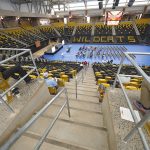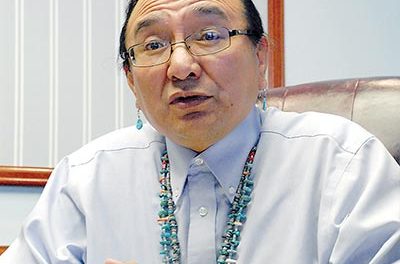
Nez urges construction of home manufacturing plant
WINDOW ROCK
If President Jonathan Nez and the Navajo Nation Council can actually work together, there is the possibility of a Tuba City housing manufacturing facility to help Navajo Nation to build homes for the former Bennett Freeze and Navajo Partioned Land areas.
During a Jan. 7 Navajo-Hopi Land Commission meeting, Nez, along with Veterans Administration Director James Zwierlein and Division of Community Development Director Pearl Yellowman, gave a presentation on the housing manufacturing plan. “This is a project we’ve all been working on in previous Council,” said Nez. “We’ve been wanting to build homes for our veterans, for our Navajo people, for some time and we have the opportunity to do that right now.”
Nez recently line-itemed vetoed dollars from the Personnel Lapse Fund, and he said he’s hoping if Council decides to re-budget these dollars, they would go toward this facility. He’s asking for support from the Navajo-Hopi Land Commission for the project.
“I envision, if we can get a package together and approved, I imagine we can start building houses by mid-summer or the end of the summer,” said Nez. “It would be a project that we could succeed on.”
Robert Black, director of the Navajo-Hopi Land Commission office, said housing for relocatees is a priority no matter in which part of the Navajo Nation they may dwell. This housing plant would be 20,000 square feet and has the potential to house staff in need of a new office facility from the Veterans Administration, Navajo-Hopi Land Commission, and Community Housing and Infrastructure Department.
This plan would bring the cost of housing construction down and allow for a greater amount of homes to be constructed by various housing programs, explained Zwierlein.
The homes envisioned to be built are similar to those the Veterans Administration has been already been working on in the VA’s administration facility in Tse Bonito, New Mexico. In August, a 1,236 square-foot modern hogan prototype, which has two bedrooms, a kitchen, and a full ADA-accessible restroom, was being built. The prototype wasn’t only meant for veterans.
The Housing Improvement Program under the Division of Community Development could use this modern hogan plan for non-veterans as well. “The purpose behind this construction method is to provide a safe working environment for Navajo tradesmen, protected from the elements,” explained Zwierlein of the proposed Tuba City housing manufacturing facility. “Housing the building material needed onsite cuts cost. This facility will also provide a safe working environment for individuals to put in their sweat equity toward their new home.”
The facility will cost $7.5 million. It will contain all the equipment necessary to build homes. The facility will allow for year-round production and eliminate seasonal unemployment. Homes would be built from two to five different floor plans, using identical panels, and because of this the production would be assembly-line style. Waste and cost is reduced, among other things, according to Zwierlein.
“This is the opportune time to get a housing manufacturing initiative across the finish line,” said Nez. “This year I am hopeful this will be achieved. The need for housing has been magnified by COVID-19.” Delegate Ray Smith said the facility is a good idea but it may take some time to get the legislation through Council and the president’s office.
“When it goes across the street (to the president), what happens?” said Smith. “It’s either rejected, accepted or line-item vetoed. It’ll take some time to get this going. Chapters are frustrated with us.”
Smith asked what building code will be used for these homes, since the Navajo Nation does not have one. Nez said they want to use the International Building Code. “We ask our Council to approve it,” said Nez. “It’s just been sitting there from one Council to the next. Once we get that code it will be ready to go. This will be up to Council to move this initiative forward.”
On the topic of Smith’s question about building codes, Zwierlein said it isn’t the codes that make the structures safe necessarily, but rather the inspection of compliance to the building codes that makes for safe structures. “We have not adopted that uniform building code,” said Zwierlein. “We do sometimes put in our contracts a requirement for contractors to retain their part inspectors to provide inspection.”
Delegate Otto Tso said the project is achievable and will create jobs. He said he was appreciative that Tuba City, which he represents on Council, is the location chosen to build and operate this housing manufacturing facility. “We just need to put money into it and build something,” said Tso. “This project sounds like it will benefit the whole Nation.”







 Highway 264,
Highway 264, I-40, WB @ Winslow
I-40, WB @ Winslow